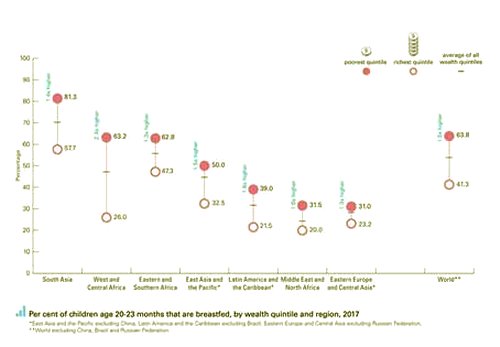New analysis released Thurday shows that 99 percent of children in Sri Lanka are breastfed at some point in their young lives while babies in South Asia including Sri Lanka are more likely to be breastfed than any other region in the world and are breastfed for longer, UNICEF said.
At least 98 per cent of children in the region are breastfed at some point in their young lives including Afghanistan (98%), Bhutan (99%), Nepal (99%), Sri Lanka (99%), and elsewhere in South Asia the proportion is also high at 94-97%.
Almost all mothers in Sri Lanka, deemed a middle-income country, give birth at the hospitals, which promote and implement 10 steps of the baby-friendly initiative. This is on par with the high-income country of New Zealand.

Breastmilk saves lives and protects babies against deadly diseases. UNICEF recommends that children should be breastfed for two years and beyond because it provides an important source of nutrients for healthy growth and can prevent half of deaths during a child’s second year of life. Furthermore, it leads to higher performance on intelligence tests among children and adolescents (3 IQ points on average).
“Breastfeeding is the best gift a mother can give her child, as well as herself,” said Jean Gough, UNICEF’s Regional Director for South Asia. “As we celebrate Mother’s Day, we must give mothers the support they need to start and continue breastfeeding.”
Breastfeeding for longer periods is important for mothers’ health; for each year a mother breastfeeds, her risk of developing breast cancer falls by 6 per cent.
“Whilst Sri Lanka should be proud that almost every child is breastfed at some point in their lives, we need encourage mothers to breastfeed for as long as possible, ideally for two years. This brings immense benefits in the form of nutrition, health and wellbeing for both mother and baby” said Tim Sutton, Representative, UNICEF Sri Lanka.
There has been little progress in improving rates of continued breastfeeding at two years of age in South Asia between 2000 (68%) and 2016 (71%). Also, in some countries, breastfeeding rates fall by over 20 per cent between the child’s first and second birthday.
The recent analysis also showed that babies belonging to wealthier families are more likely to miss out on continued breastfeeding. In South Asia, 81 per cent of babies aged 20-23 months from poorer families are breastfed compared to only 57 per cent in richer families.
This trend is seen across the world. 7.6 million babies are not breastfed, and babies in the world’s richest countries are most likely to miss out. Figures show that an estimated 22 per cent of babies in high-income countries are never breastfed. In low-and-middle-income countries, the rate is 4 percent.
Factors leading to higher breastfeeding rates vary. Countries like India and Vietnam have put in place strong policies to protect and promote breastfeeding. Others like Turkmenistan have very high rates of mothers giving birth in baby-friendly hospitals. Almost all mothers in New Zealand and Sri Lanka give birth at a baby-friendly facility. Additionally, cultural and political contexts, including support from fathers, families, employers and communities, play a decisive role.
Through its global campaign, Every Child ALIVE – which demands solutions on behalf of the world’s newborns, UNICEF urges governments, the private sector and civil society to:
- Increase funding and awareness to raise breastfeeding rates from birth through the age of two.
- Put in place strong legal measures to regulate the marketing of infant formula and other breastmilk substitutes as well as bottles and teats.
- Enact paid family leave and put in place workplace breastfeeding policies, including paid breastfeeding breaks.
- Implement the ten steps to successful breastfeeding in maternity facilities, and provide breastmilk for sick newborns.
- Ensure that mothers receive skilled breastfeeding counselling at health facilities and in the first week after delivery.
- Strengthen links between health facilities and communities, so that mothers are ensured of continued support for breastfeeding.
- Improve monitoring systems to track improvements in breastfeeding policies, programmes and practices.
On Mother’s Day, recognized in May in over 128 countries, Every Child ALIVE is celebrating mothers and babies and their right to be supported through pregnancy, delivery and birth.






